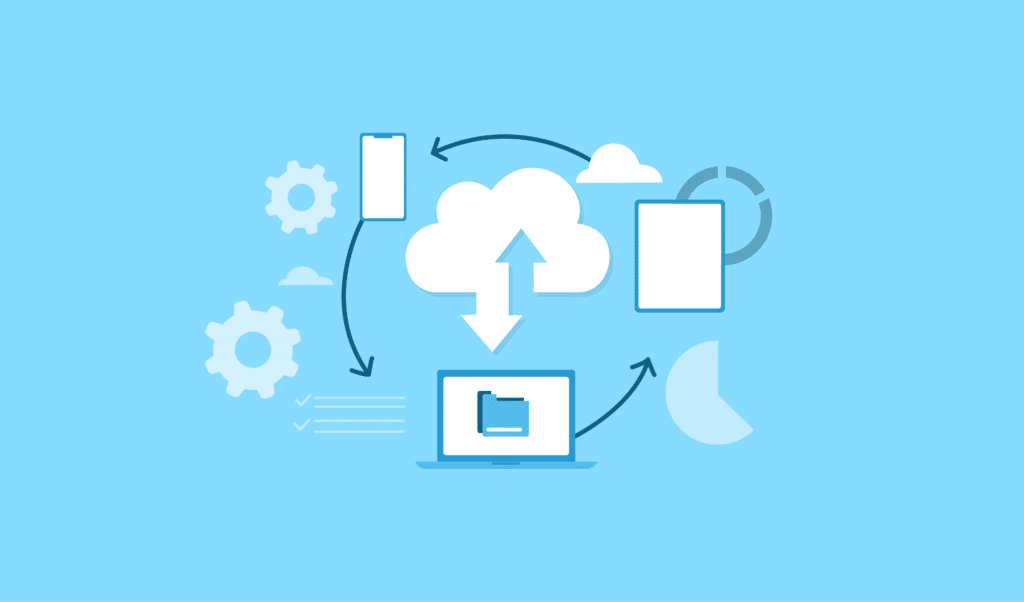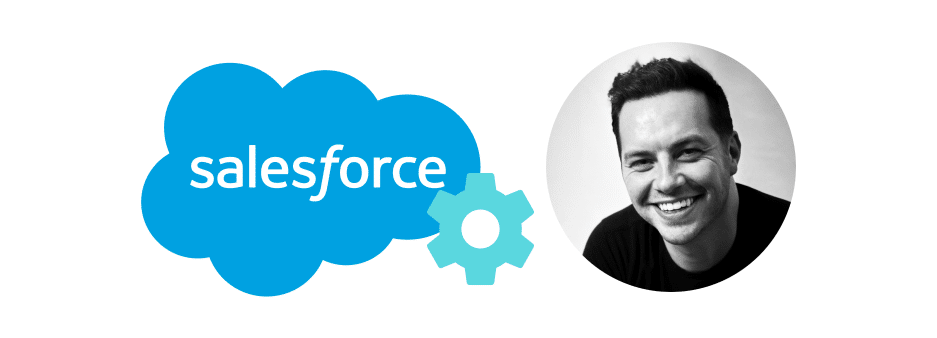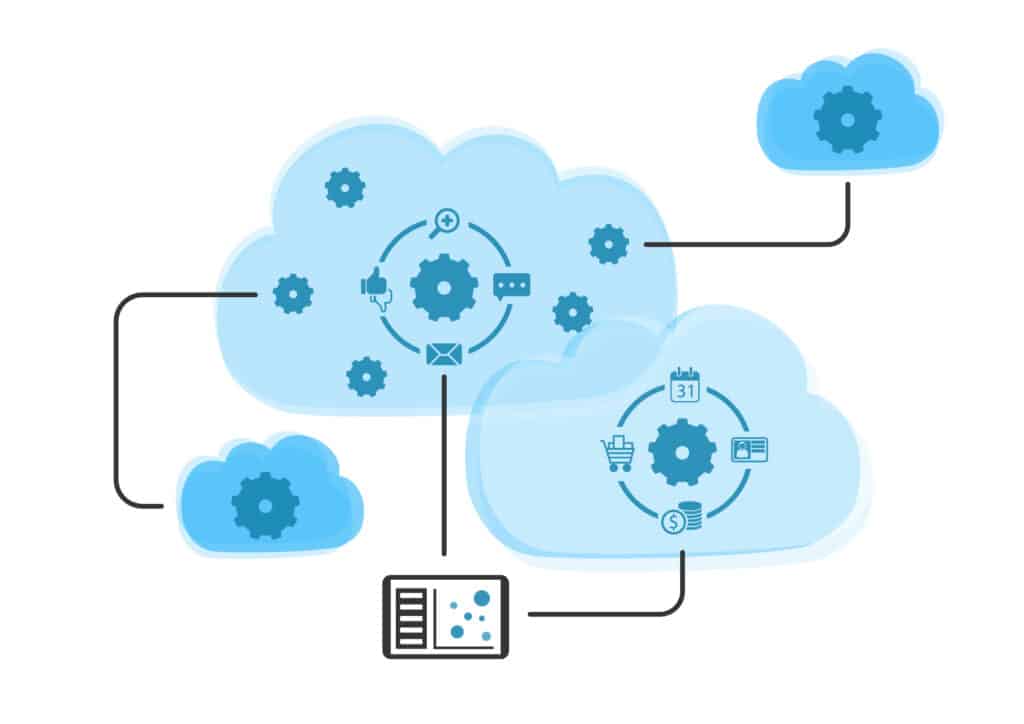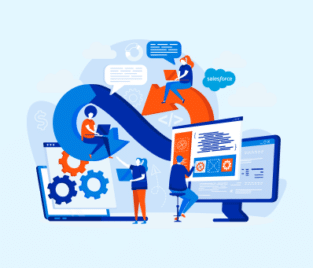Save Millions a Year and Build Orgs for Billion Dollar Companies with Jordan Nelson!
Jordan Nelson runs Simple Salesforce, a consultancy firm that saves his clients millions of dollars a year using automation and the power of the planet’s leading CRM. Jordan has helped build several orgs for billion-dollar Salesforce companies and has recently been named a LinkedIn Top Voice. This puts him in the top 0.5% of the LinkedIn community and officially recognizes him as a thought leader in his field. He is one of the only members in the Salesforce influencer space to achieve this!
A Salesforce prodigy, you might think Jordan comes from a traditional college background and grew up planning to dominate the world of tech. Well, think again! Jordan’s story is an unconventional one, from growing up in a blue-collar town to dropping out of college, he has overcome many obstacles to summit Salesforce success.
In this interview, Ben Miller, Senior Account Executive at Titan, sits down with Jordan to find out what makes him tick. Check out the highlights from this conversation!
Ben: Let’s get into your journey a little bit. You didn’t come from a traditional background, did you have a desire to get involved in tech when you were younger? Is this something you thought about at some point?
Jordan: It was pretty untraditional, in all honesty, I didn’t know what Salesforce was. Tech, maybe, but I didn’t have family or friends doing much of that. My parents come from a blue-collar city called Price, Utah. It was blue-collar back in the day, so their parents grew up working at power plants, my grandpa was a coal miner. It’s a very blue-collar city, my parents branched out from there, got into some Sales stuff, they worked at some companies. So [tech] wasn’t something I grew up around.
When I started going to college at the University of Houston, I ended up dropping out and starting my own business right from the jump. I had been studying an entrepreneurship program.
So I thought the best choice I could make at that age (being 20 with no life experience) was to start a business with really no skills.
I had seen a product online on how to wrap vehicles and there seemed a big market for this in Houston. I ran this business out of my parent’s garage and ended up doing really well. I moved out of my parent’s place and to Salt Lake City and kept the business.
At 21, I started working at http://Jet.com , which was later acquired by Walmart eCommerce and that was my first “thing” in tech, doing tech stuff. I started in their call center and moved into a Business Analyst role. At that time I met a guy named Ryan, and he was our Salesforce admin for the company, based out in New Jersey. But he was cool enough that when he would come into town, or when we had calls, to talk us through Salesforce and what it was all about.

At that stage, I was 24 and newly married, I had still been doing my car wrap business on the side but it wasn’t going the route I wanted. So he [Ryan] told me about this track you could go down in Salesforce and I was like “Perfect, I need to figure out how to make money, I need to figure out how to get into a career, now I’m married, I kinda need to figure that stuff out”.
I shut down the shop and went all in on the Salesforce stuff, I started learning about Salesforce on Trailhead. I then applied for jobs like crazy and someone here in Utah was awesome enough to give me that shot. The first company I worked for was Podium.
I moved to this SaaS company with really skilled Salesforce developers and employees. It took off from there! I loved it and kept moving forward with all the other jobs you see on my resume.
So a little bit untraditional how I got into it, and how I landed into it, but it’s been a great story so far!
Ben: One thing I love about what you’re saying is that often when people want to get a job in tech they think they have to move somewhere. In your case, the company you started working for was not far from where you grew up. And that’s fascinating because even though I know there are a bunch of companies in Utah, it’s not the place you think you will get a job in Salesforce.
Jordan: Yeah that was cool, the way it worked out. And I was so new to it too! So very similar to you, I had no idea the Salesforce ecosystem was so big and that so many companies used it. I thought it was this one-off thing and maybe I get lucky and someone uses it…but I started finding out that a ton of Fortune 500 companies use this tool.
It was a whole different way of looking at life! It changed the lens of how I could look at my career moving forward and the opportunities available while learning this cool skill.
Ben: Another thing you mentioned, is that the SaaS company you were working for had a bunch of Salesforce resources, so they were already deeply invested in it. I speak to customers in Salesforce all over the world and there is such a difference between a small business with the CEO managing Salesforce and another small business that has hired an admin or partner. A medium-sized to large startup with a team involved in Salesforce, with a roadmap, makes a big difference.
What was it like looking back and realizing you got to work at a company with those great Salesforce resources?
Jordan: Well it was one of those moments where it was so early on. I was 24 at this point and this was my first “big-kid” job. I’m barely starting up, there’s a lot I don’t know and as I move onto these other startups, they didn’t have the resources. When I was looking to leave that first company, because I didn’t stay too long, they did tell me the grass isn’t always greener…but I didn’t realize it at the time. I had such a good start and the job itself was so awesome, the employees were so great that I thought all my other jobs would be like this. This was Utah, pre-pandemic, I didn’t think I would work remote and thought they would all be similar.
I realized the hard way that it’s way harder when you are alone and you don’t have someone like an architect with 10+ years of experience who is certified-up to give you advice. Ultimately, I flipped the script too, when I went for interviews and also in my consultancy, that’s the advice I give: that this [Salesforce] is literally going to be the brain of your company. Everything you do, all the data is going inside this thing. Often in startups, it’s an afterthought. Especially in the SaaS world, companies invest in their Product, Marketing, and Sales but under-invest in their Salesforce.

It made it difficult when I worked in companies like that to hire the right talent. The businesses didn’t always see the money and time it was saving them! Looking back it was an awesome opportunity to be surrounded by great Salesforce resources right off the bat.
Ben: Yeah, for sure, in my experience working with Titan, there is a massive difference between companies that see Salesforce as a burden or as the backbone of their data plan. I can tell right away how people feel about this. Oftentimes C-Suite or company leaders purchase Salesforce but they don’t know how to use it, which is a missed opportunity.
Your journey continues. In this story, you have now worked in a couple of different companies. What’s the biggest Salesforce project you managed?
Jordan: Well I worked for a public company that has been public since 2002, their name is Health Equity, a blend between tech and healthcare. Their big bread and butter at the time was setting up HSAs for Insurance people. It was a massive company, they had been around forever, and right when I was getting into them, they were on an acquiring streak as well. They acquired a few big companies! And my team was 20+ people. This project ended up being a two-year gig and involved multiple Salesforce admins and developers. There were a lot of moving pieces, it was a massive company where there were a lot of things I needed to be aware of. There were many audits and obviously, with healthcare, you are dealing with lots of personal information that can’t go out. I learned a lot going through that company. Before then, I had only worked with two startups. So far all I knew in Salesforce was you move fast, make decisions quick, and if you break stuff in production no big deal, we will fix it.
Moving into this world at a big company, it was a new process…there was literally a process for everything we did there. We had to get checks and balances, failing an audit had strict consequences and you risked compliance being revoked. It’s a big deal you do it the correct way.
After this experience, I struggled to move back to a startup, which I did later. I was still trying to apply a slower mentality. I was so adjusted to moving slower and asking lots of questions. At the massive Health Tech company, we had multiple resources with people in different roles. Moving back to a startup, I wasn’t working as fast as I needed to, I needed to make split-second decisions and it was a hard transition. In these experiences, I got to see the differences between startup life and a bigger company with more to risk. Both were great to learn from in the Salesforce space.
Ben: Yes for sure, in my experience bigger corporations, like banks, move slower. It is not always easy to relate to that coming from the SaaS world. There is something to moving slower because everything is always planned out…it is two different ways to work though.
I’m interested, in the big organizations, is there one place you found Salesforce provides the most value? Is it to Sales, is it the automation, is it the doctors? Where do you think it is for these organizations?
Jordan: Look, I don’t have a full overall skill set in everything, I have been placed towards automation so this has been my niche. Especially at a bigger company, you get a niche, and automation has become mine at my consultancy company. My bias is there. The biggest unlock in my brain was doing the math and realizing how much money a company is saving via automation.

When I was simply an employee, working as an individual contributor, I would just do the ticket, I never looked down the pipeline to see the benefit of say, a Salesforce Flow.
Now as a consultant, I need to ask these questions to find the value. I actually ask questions before I take on a project. For instance, we can turn 14 minutes into seconds for clients. Now you can multiply that by what people are being paid an hour. This brings you down a “math path” where you can add up these savings and for me, this is the benefit and where the power of Salesforce is really unlocked. You know, if you automate that one thing, that can save you 50 bucks right there! So it’s trying to make that connection.
This is the best bang for your buck with Salesforce! And it adds up quick.
Ben: It’s cool for you to have gone from making the automations in the technical sense, where you can get lost in details to selling it as a service. And now you are helping others to improve in their organization. That’s a really cool transition. It’s nice to hear from consultants who actually didn’t want to be consultants but did it because they gained skills and can help others improve in their organization.
Now you are taking on clients, what does your ideal client look like?
Jordan: Definitely automation! Look, I have a Jack of all trades “thing” given I have had wide-ranging expertise. My ideal client is in the tech space and is making at least 20 million in ARR, it helps if they have at least Series B funding with resources. In most cases, this client is looking at Salesforce as an enhancement. Once they have raised money and have cash on hand they want to get Salesforce a bit better. Ideally, I get to interact with someone who has some kind of operational role in place like an IT, Marketing Salesperson. Because that person bridges the technical side of things and the vision of the business. They can understand the technical side and pitch it from a business perspective.
Ben: So under them, they don’t have their own admins?
Jordan: Look, it’s both. Most of the time they don’t have a team yet, they just bought Salesforce and are in that place where they are wondering, “What do we want to do?” They are usually wondering “Do we want to hire someone in-house or do we want a consultant?” From a price point perspective, you can go hire someone for say 70K, and they might have 1,2,3 years of experience OR you could hire someone with 7 years of experience who has built Salesforce orgs for tech companies and this will only cost you 100K a year (because I won’t work full time). So for 30K more, they can get someone with way more experience and specialization. The advantage of a consultant is they can set up the foundations.
My goal is not to be with the organization forever. I am coming in as part of a short-term vision, say 1-2 years. Then long term they can hire someone cheaper to maintain this. We help them strategize and set themselves up. In my case, I used to be that guy with 1-2 years of experience, and at that time you can’t handle all the architecture when you are still learning flows and all this 101 stuff. I think it is too much for someone at that stage. This is the advantage of a consultancy, it is a little extra but it will set you up to hire someone and we can help you find the right person. As the consultant, we show our value through a proven track record.
Ben: This is a little different to other independent consultants, you want to help companies with the longer vision and hiring someone to maintain this multi-year plan. You are a consultant people can call but you are also trying to bring this long-term vision to the table. This means this is not a one-time investment. Instead, you set up businesses to stick with this living organism which is Salesforce. For business owners, this can often be the hard thing. Business owners can often find this continual investment tough. But we all know that as your business grows, your Salesforce does too.
Jordan: Yeah, a lot of what I end up doing is trying to educate, as a Salesforce internal user, you need to teach businesses that they will benefit from Salesforce. For example, there is awareness that marketing professionals, salespeople, or product experts are permanent and your business needs them. Many people buy Salesforce and think one and done, and I’m good to go. But you need to build new things as your business changes.

The example I use with them is, that they go to a Salesforce guy, who is selling them Legos. The Salesforce AE doesn’t show them the Lego pieces but all the cool models he built with the Legos, for example, Star Wars and different Lego models. He then dissembles it, puts it in a bucket, and when the customer takes it home and unwraps it they realize it is just a bunch of Legos and not the cool models presented. And they don’t know how to put the stuff together. They end up being frustrated and disappointed because they didn’t know they needed the people and resources to get to that point. So you’re in that space where you need to educate them on that. So to build all those Lego models you want, you can’t do this on your own and you need people to help with it.
Ben: I love this approach, it connects with so many organizations I chat with in Salesforce. When someone says they do everything in Salesforce, there is something so healthy about it! It’s not that they didn’t have hardships or go through that stage where they got back with the Lego pieces…but they carried on.
And I have heard business owners say on LinkedIn, “I sold my company for next to a million dollars because we had Salesforce, we didn’t really want it but when it came time to selling, this is a massive ROI to pitch to investors, when you have a strong reporting engine”. This is what makes the ecosystem so cool, some organizations use Salesforce as a CRM in the most archaic sense of the word and others in incredible ways. I love seeing the variety of the different places people take it.
We have talked about the type of clients you are looking for. As a consultant do you see yourself building a firm around this? And would you say you are a traditional or non-traditional consultancy firm? What’s the direction you want to take this?
Jordan: I started with just me, now we have a junior consultant and another Salesforce consultant. Contractually, we are working with architects and someone full-time on social media. So there have been 5 or 6 people involved in the business to get us where we are already. And I felt there was a space there for me specifically in the sense that I have always been in a people-facing kind of role. As I have continued to refine that, I have noticed that typically you get a consultant from a reputable place and they are lined up with clients for billable hours. On the user end, it is not always great for the business because “OK I hired this consultant, BUT any time I need a message or call, the consultant isn’t always available.” It makes it hard for the client to feel like we are in this together.
What most businesses want is for a consultant to feel like a full-time employee! I fill that gap, so I am trying to sustain limiting client intake. I join their Slack and their Teams and make myself more available. Your business changes and ad hoc things come up, this is what I am here for. I don’t want businesses to feel they hired this guy and never hear from him! For me, it is important to work out how many people we should have per consultant and how many billable hours work with that person. Businesses constantly change and I want to be here for that.
Ben: People have started reaching out to me about the trust layer and AI, what do you think the big trends are this year? What will be talked about in the Salesforce space?
Jordan: AI for sure, In 2022 Chat GPT was rolled out and made a big impact right away. It took 2 paths. For one, people started working out all the prompt engineering and used it to their advantage. The other group of people used it for silly things and random questions but chalked this up to a novelty. I think it will be interesting to see the group hacking through and trying to understand it, I have seen AI force, meant to be Salesforce Chat GPT, and that will be interesting! Salesforce is trying to roll that out within Salesforce, and it will be interesting to see how it plays out. and what direction it will go in. But that group will push through.
It will also be interesting to see if all the NFT stuff comes back, the NFT Cloud was released and then the economy crashed. That technology is really cool, say working with health organizations. So what is safe to share? NFT blockchain-type stuff keeps things traceable and verified. This is the direction the pioneers want where smart contracts will be easier to access. Lots of people put health data on Google or iPhone, but it’s not so safe, so what is the alternative?
Lastly, we have gone more and more into remote work. What will people do with their careers? Many people who are back in the office want to go off on their own to stay remote and to supply their skills in a niche.
Hand in hand, personal branding will be big. When you are building a brand, it is just your time you are syncing in, you don’t pay. This is a huge differentiator. For example, Elon Musk has a massive personal brand. He can influence markets based on what he says. You can see influencers join with big brands to help build them up and then sell for billions.
These are my three trends: the blockchain, AI, and it will be super interesting to see the Salesforce market pushing against being called back to the office.
Ben: Are you active on places other than LinkedIn?
Jordan: I am but it is at nowhere near the size. I am on YouTube and on X. I am trying to get into the YouTube this year. I have a couple thousand subscribers on each of these platforms.
Ben: This has been a really great conversation, hopefully this is the first of many, and next time maybe we can go more technical. To finish off, do you have advice for people in the Salesforce ecosystem?
Jordan: If I was speaking to my younger self, the biggest thing is consistency. There is a pretty big gap between 0 and step 1. Once you get past step 1 it is easier. Keep going and working on your personal brand. It will be a grind. Once you accept this, the consistency is easier. One YouTuber I follow has said that the first 50 videos you make will be horrible but you need to get through it. So get through those as fast as possible. Know there is a grind and you will get to the other side of where you want to go.
Ben: Thanks for your time!
Jordan: Thanks, I appreciate it!
Salesforce Radio
This is the first of many conversations Titan will be having with Jordan Nelson. Keep following us for more updates and Salesforce news!
We hope to see you soon!

Disclaimer: The comparisons listed in this article are based on information provided by the companies online and online reviews from users. If you found a mistake, please contact us.



